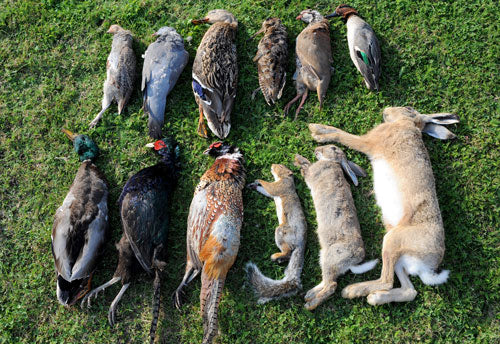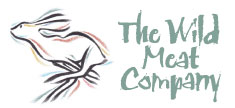Conscientious Eating with Game
by Robert Gooch November 13 2022
Eating less meat is a change we’re all being urged to make to help cut greenhouse gas emissions. But we don’t need to stop eating it all together – we just need to switch to conscientious choices, such as abundant and sustainable wild game.

The British love of roast meat is famous around the world. While the French tried to insult us by calling us “les rosbifs”, patriotic Brits were merrily singing “The Roast Beef of Old England" in theatres throughout the country. Officers of the Royal Navy still sing the ballad when they sit down to eat – but times are changing. People are becoming increasingly concerned about the environmental impact of beef. Chicken, which overtook beef as the UK’s most popular meat in the 1980s, is considered a more environmentally-friendly option, as recently reported by National Geographic. The methane released by cattle is said to be many times more potent a greenhouse gas than carbon. And that’s not the only issue. Reports show that beef takes 10 times more resources to produce than chicken.
This does not mean that chicken is low-carbon, however. Chicken eaten 3 or more times a week contributes an incredible 284kg to your annual greenhouse gas emissions. So should meat really be part of a sustainable eating plan?
The planetary health diet
One in eight people now identify as vegetarian or vegan, according to an annual food and drink report from Waitrose. Yet, the first ever science-based diet designed to sustain a bulging population without causing environmental damage does not recommend cutting out meat or dairy altogether. Instead, the Eat-Lancet Commission’s "planetary health diet' only suggested eating much smaller quantities.
When asked why meat wasn’t banned, Harvard professor Walter Willet, one of the diet’s creators, said that he felt a strictly vegan lifestyle was not necessarily the healthiest route or indeed the most effective in achieving the commission's goals. Conscientious or flexitarian diets (eating meat only occasionally), it seems, are more advisable.
Farmed meat versus wild game
Meat provides proteins, iron and vitamin B12, while fish provides oils, such as Omega 3 fatty acids. Vegans who do not plan their diet carefully can miss out on essential nutrients, which is why meat is included in the planetary health diet. As stated on the NHS website, “The body needs vitamin B12 to maintain healthy blood and a healthy nervous system. It's only found naturally in foods from animal sources. Sources for vegans are therefore limited and a vitamin B12 supplement may be needed.”
Wild game is much leaner and lower in fat, with greater nutritional value, than farmed meat. It also has a dramatically lower carbon footprint, being a natural product. As we source much of our game locally, transport emissions are also much lower than with industrially produced meats.
Squirrel was recently dubbed the “ultimate sustainable meat”, as it is being culled anyway, whether people eat it or not. Food waste massively contributes to carbon emissions so eating this nutritious and tasty food, instead of letting it go to waste, is an ethical choice we are proud to make.
Wild venison, rabbit and wood pigeon are also animals that need to be culled to maintain sustainable populations. Eating any of these wild meats instead of intensively farmed meat is a conscientious way to enjoy a satisfying, balanced diet without harming our planet.
 Here at the Wild Meat Company, we are committed to minimising our energy use and carbon emissions to maintain wild meat’s low carbon footprint. We recently received a Suffolk Carbon Charter silver award for our work and were commended for our environmental policy, use of alternative packing materials and work with the Country Foods Trust to reduce waste food.
Here at the Wild Meat Company, we are committed to minimising our energy use and carbon emissions to maintain wild meat’s low carbon footprint. We recently received a Suffolk Carbon Charter silver award for our work and were commended for our environmental policy, use of alternative packing materials and work with the Country Foods Trust to reduce waste food.
What about free-range meat?
If you would like to enjoy beef, pork, lamb and poultry as part of a balanced, healthy diet but are concerned about climate change, take care to choose sustainably produced local options.
In a recent report on meat eating and climate change, Winchester Action on Climate Change (WinACC) made some important observations in favour of free-range farming, especially with regard to the role properly managed pasture land plays in capturing CO2.
“A cow or sheep that has been raised on sustainable pasture contributes to a carbon-rich topsoil from its dung,” the report states. “The natural permanent grasses that feed the cow or sheep are said to be the largest terrestrial carbon sink on Earth.” Furthermore, grazing can maintain habitats and encourage the growth of wild flowers.
Responsible British farmers are working hard to tackle climate change, as the NFU are keen to explain. So, to ensure the meat you eat has the smallest possible carbon footprint, our advice is to choose wild game or responsibly produced free-range meat.
Quality over quantity has never been more important.

